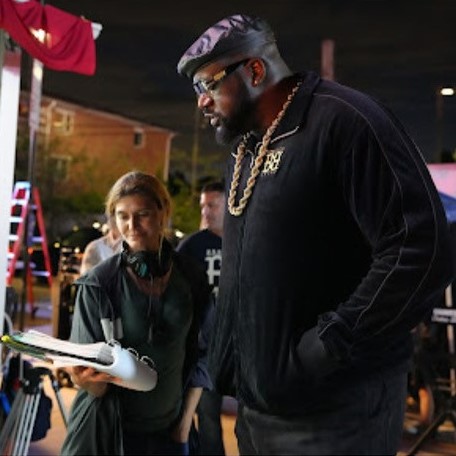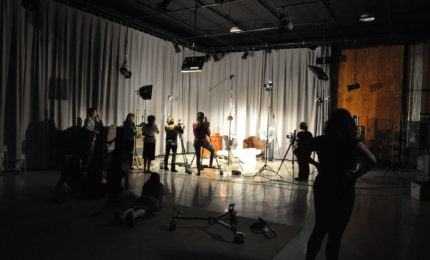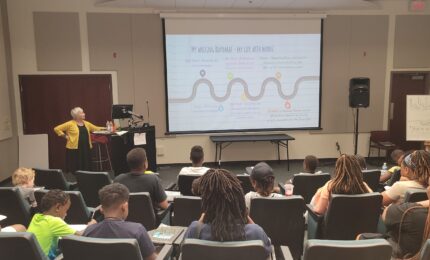Production Jobs Deep Dive: Script Supervisor
By Grace Smith | December 3, 2024
When you are producing a film, you can have dozens of takes of a single shot. And sometimes there are shots that take place seconds apart in the finished product but are filmed on entirely different days. So how do you make sure everything makes sense? How does the actor remember which hand they were holding a coffee cup in last week? How does the set dresser remember the angle of the paper on the desk from the day before? That’s where the script supervisor comes in.
A script supervisor is a crew member whose job is to maintain the continuity of the film, television, or commercial project in regard to everything on screen, including hair, makeup, wardrobe, props, set dressing, and the actions of the actors. Remember that famous scene in the Wizard of Oz, when Dorothy’s pigtails go from long to short then long again in the space a few seconds, or the notorious coffee cup in the last season of Game of Thrones? A script supervisor’s job is to prevent those things from happening, but it’s a very hard job and even the pros make mistakes sometimes.

“If the continuity is off, you are forcing the editor to make cuts that can affect the quality of the film,” says Andrea Fantauzzi, who has worked as a script supervisor on several projects. “For example; in a wide coverage shot you have an actor wearing reading glasses, then later, a mid or close-up the glasses are missing. I can say from experience with the other side when working as an editor, it severely limits your usable shots.”
Chelsea Zotta, another experienced script supervisor, echoed the importance of this role on set. “Perhaps one of the most important reasons the Script Supervising role was created was to prevent reshoots as much as possible…If you shoot a scene with an actor in the wrong clothes, missing a bruise that should be on their face, missing a prop, have a piece of set dressing way out of place or completely missing, chances are that you will have to reshoot a scene which means that production has just lost time and possibly a lot of money. I have worked on scenes that have cost around a hundred thousand dollars, so I can’t stress the importance of taking great notes, taking great pictures, being observant and being fully present.”
In addition to tracking continuity, the script supervisor is also in charge of taking notes for the editor. “You describe the shot, but you also write down any continuity issues for any takes, what the director likes or dislikes, any lines missed, any technical issues like a light flickered, image vignetting, a focus buzz, etc.” Zotta says. “You also want to make note of any ‘circle takes.’ Great notes will help save the editor time, which generally means saving production money. So, take the time after wrap to clean up your notes before sending them in.”
It can be a stressful job, and sometimes other crew or cast members react poorly to receiving notes. “Emotions tend to run high on set, due to pressures of performance (whether cast or crew) and the amount of time and money being spent – in combination with a poor sleep schedule,” says Fantauzzi. “Furthermore, some new directors and producers are not familiar with the role of a Script Supervisor. Communicating your role and expectations ahead of time (or at an appropriate time when an issue arises) is key to avoiding miscommunications.”
But Zotta also says that it is best to just make note and move on. “It’s your job to point out continuity errors, so once you point out the error to the Director, if they don’t take your recommendation, drop it and make a note to the editor. Your job is only to make the error known and then it’s the Director’s job to fix it or not.”

When asked about the most important quality for a script supervisor to have, Zotta said there are two very important ones. “[E]ither being observant or detail oriented. I’m not sure which one to rank higher. You need to be focused on all details before you start rolling, but once you start rolling, you focus on what is seen on screen. Most importantly, you need to focus on how the actor speaking handles his/her props. You need to focus on if any lines are missed or changed. You also need to check if any big set dressing pieces are missing or have been ‘cheated’ too far which won’t match previous coverage. In my opinion, you need to be able to focus on the big picture items like story continuity, as well as the small things like the actor how many buttons are unbuttoned on the actor’s shirt.”
Fantauzzi had a similar response. “You must be detail-oriented above all else,” she said, but added “And yet that’s irrelevant if you’re too afraid to speak up when an issue is noticed.”
Both Zotta and Fantauzzi had advice for people interested in becoming script supervisors. “My recommendation to any aspiring Script Supervisors is to start pen and paper before going digital,” Zotta says. “You want to have a grasp on the job before throwing a software into the mix. Start working on low pressure jobs such as short films or student films until you feel comfortable to move up to low budget features. Keep working up the ranks as you begin gaining more understanding of the job and the flow of working on different sets. Don’t rush yourself, take the time to learn the job the right way. There are plenty of great books out there and even a few good Script Supervising courses to take. If anyone reading this article wants some book or course recommendations, please do send them my email.”
Fantauzzi stressed the importance of understanding other roles in a production. “The biggest piece of advice I have is organization (colors are your friends) and understanding and knowing how to create a Tags Report if needed. But if you truly want to be exceptional at your job, learn about editing as well. It will make you appreciate a good Script Supervisor.”
If you are a script supervisor and are interested in working on more productions in Missouri, we invite you to make a listing in the Missouri Film Office’s Production Services Directory. If you want to learn more about being a script supervisor or filming in Missouri, please reach out to mofilm@ded.mo.gov.



